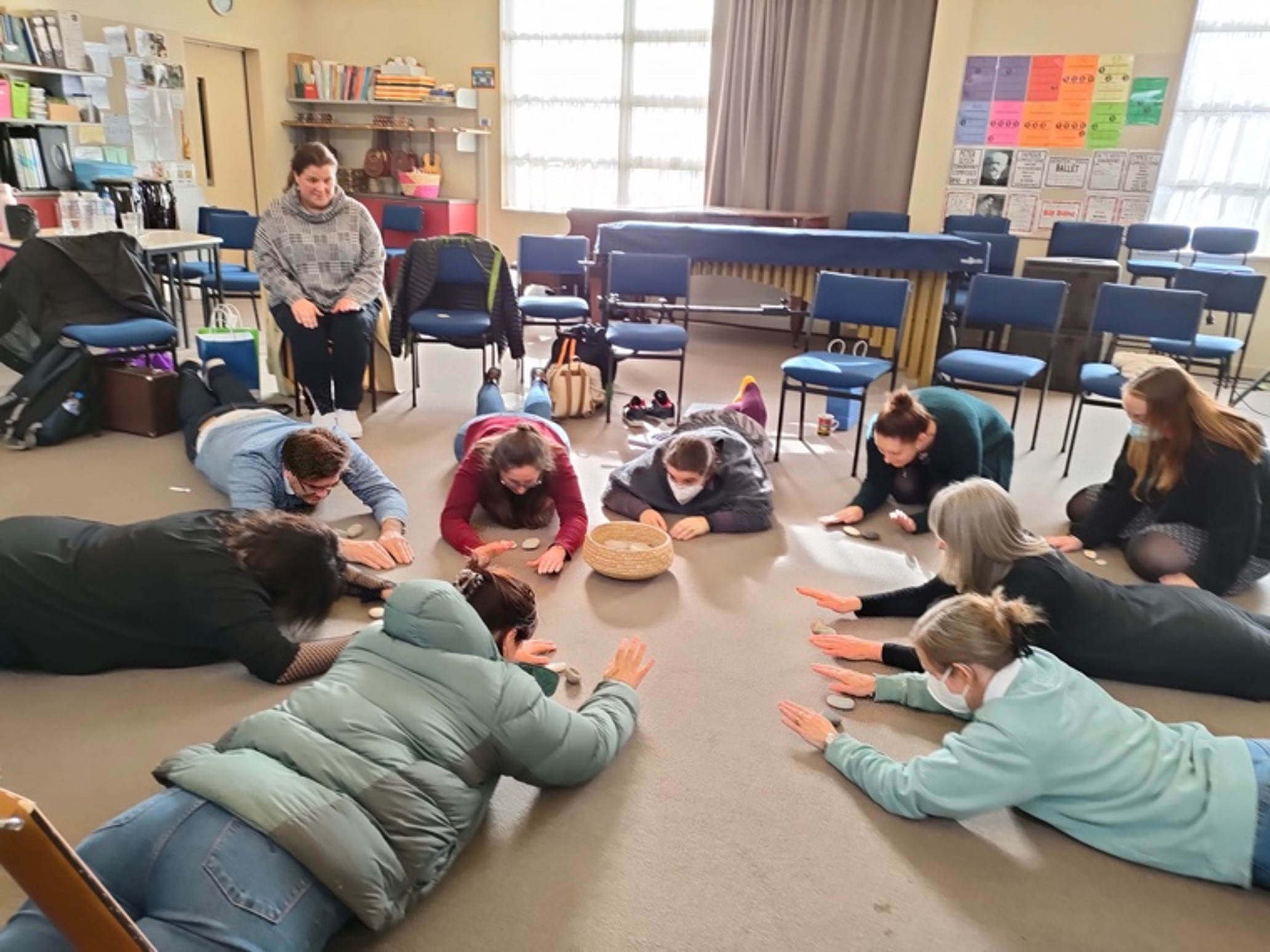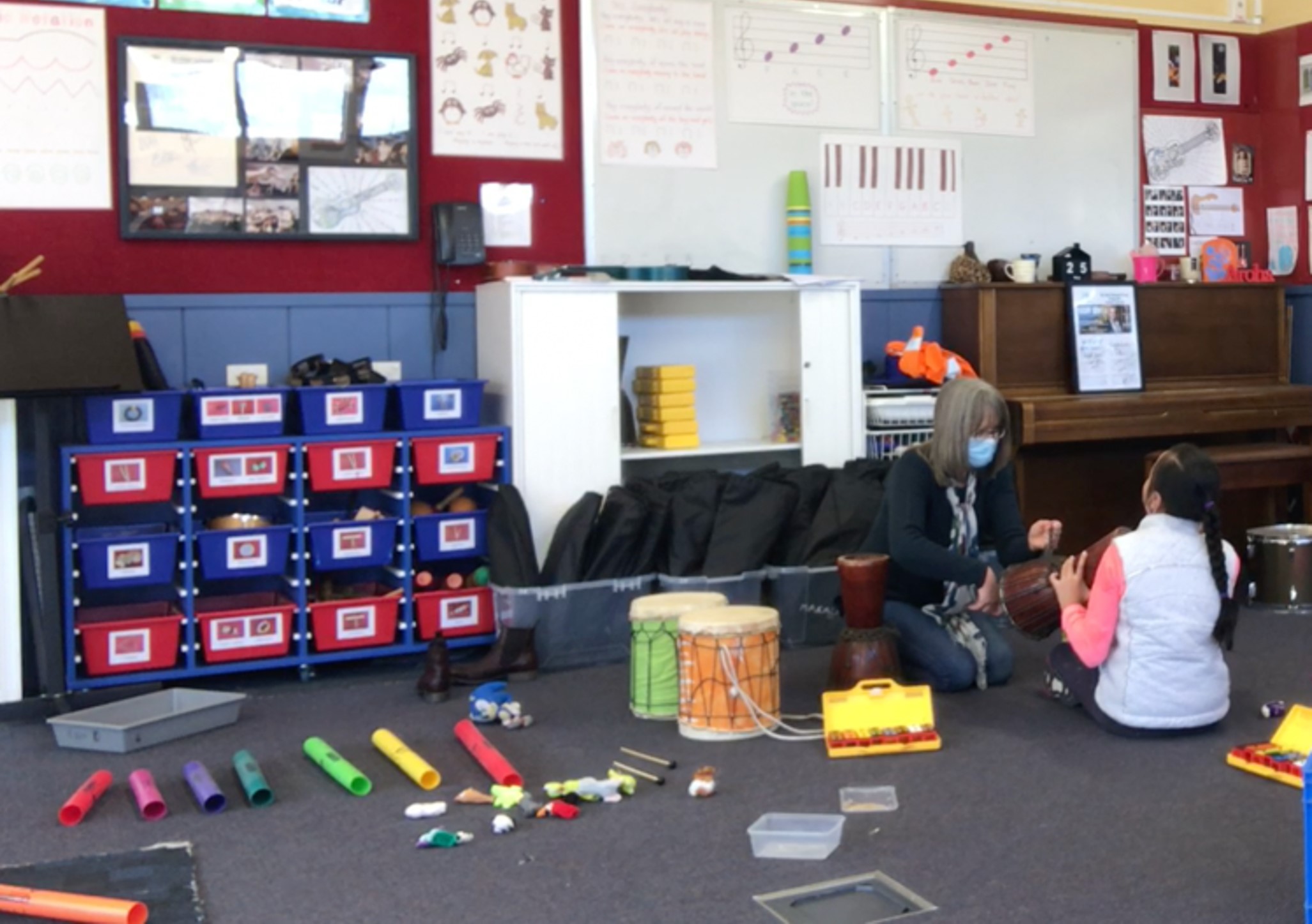2021 "Grants For Good" Spotlight Interview
Alison Caldwell
We are delighted to see our funding and resources are helping Alison Caldwell to pursue a Postgraduate Certificate in Musical Play Therapy through the Julie Wylie Institute of Musical Play in Christchurch.
1. Tell us a bit more about yourself?
I am the specialist music teacher at St Clair Primary School in Dunedin, teaching 400+ children every week in class music sessions plus lunchtime instrumental groups. Music teaching is not just my job, it is my life. I am on the committee of Music Education Otago, a voluntary organisation that runs workshops for teachers and events for students, including the annual Ukulele Kids Jam, which brings together over 1000 kids to share the enjoyment of playing and singing. I am also a trustee of the NZ Ukulele Trust, which produces resources and instruments for primary schools throughout Aotearoa through the Kiwileles programme. In my spare time I support Kiwi and international musicians by attending (LOTS of) live music events.
2. What are you doing?
In 2022 I was awarded part-time study leave to pursue a Postgraduate Certificate in Musical Play Therapy through the Julie Wylie Institute of Musical Play in Christchurch. This is comprised of four modules of online study plus a one week in-person seminar with the facilitators and other course participants.
3. What inspired you to do what you’re doing?
I have attended several inspiring workshops with Julie Wylie in the past and knew that learning from the team at the Julie Wylie Institute of Musical Play would inform every aspect of my teaching. The year of study would enhance my ability to work with all children, particularly those for whom accessing the mainstream curriculum can be challenging.

The Postgraduate Certificate in Musical Play Therapy is the only course in NZ that brings music and play together to enhance children’s physical, mental and emotional health and well-being, so was the perfect fit for my research.
4. Why did you choose to focus on this topic?
In my 18 years as a music specialist teacher I have seen first-hand the importance of a quality music education for all children. For many children music is their best means of expressing themselves. The music room is their safe place and their time to shine. I have been fortunate to work one-to-one with many of our neuro-diverse children and have witnessed the benefits of individualised therapeutic music sessions. I have observed anxious children become focussed and engaged and used music activities to build children’s confidence and sense of belonging. This inspired me to find out more about why music us such an effective way of relating to all children.

5. What made you decide to apply for an HealthCarePlus Grant for Good? (where did you hear about it)
Sometimes good luck and timing are your very best friends. An email from HealthCarePlus popped up in my inbox in the very week I completed my application for the course. It was too good an opportunity to ignore!
6. How was your experience in Appling for the grant?
The criteria for the grant application matched so well with my study intentions that it was easy to complete the documentation. I wrote from the heart and ensured I addressed all the requirements of the application form. As always, having a trusted colleague cast their eye over my proposal proved beneficial.
7. How has funding from HealthCarePlus helped?
The grant covered the full amount of my course fees, which has been greatly appreciated.
8. What does this grant mean to you?
Obviously, the financial implications of receiving the grant have been significant. Just as important, however, has been the affirmation of having Grants for Good support and acknowledge my area of study.
9. What would you say to others considering but hesitant in applying for a grant?
Absolutely give it a go! If you are passionate about your area of research, or your proposed project, it will shine through in your application. At the very least it will reinforce in your own head why you are doing what you are doing, and at best you will be one of the successful applicants and have your project and passions supported and fulfilled.
10. What advice would you give to future Grants for Good applicants?
Give yourself time to put together a solid application. Draft and recraft your application, giving as much information as you can, and ensure you have met the criteria given.
11. What are you hoping to achieve?
I came into the course with an open mind about what I would learn. The course readings have resonated strongly with my own experiences in the classroom. They have reinforced the importance of music in the lives of children, particularly those with specific learning and emotional needs, and those who have experienced trauma in their early years. My research has outlined approaches to teaching that will ensure I better meet the needs of individual children.
I have also met a new network of professionals to work alongside and I plan, in time, to share the knowledge gained with colleagues in my own school and in the Dunedin area.
12. In what way will your course help make a positive impact on others?
Completing this qualification will add significant value to the education programmes at my own school. From my research I will be able to bring robust theoretical knowledge and a wealth of new strategies to my work.
Through my involvement with Music Education Otago, Music Education New Zealand Aotearoa, Orff New Zealand Aotearoa and the NZ Ukulele Trust, I will be able to share my learning with colleagues throughout Aotearoa.
If you are interested and want to know more this year's Grants for Good and how to apply for one then click below.

Leave a comment